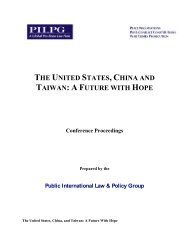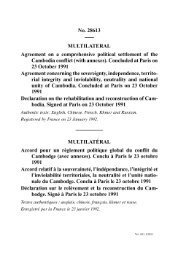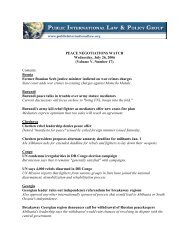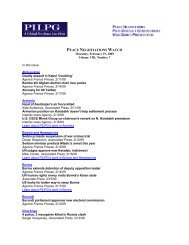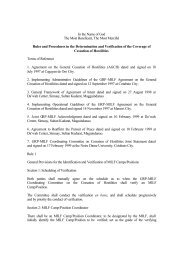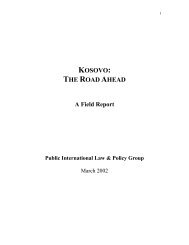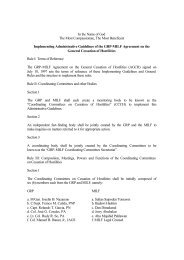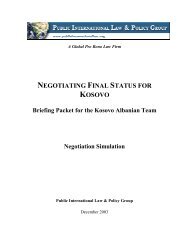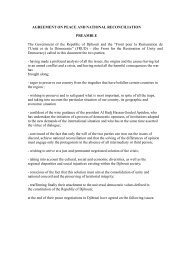Title: Strengthening Albania's Judiciary: The Role and ... - PILPG
Title: Strengthening Albania's Judiciary: The Role and ... - PILPG
Title: Strengthening Albania's Judiciary: The Role and ... - PILPG
Create successful ePaper yourself
Turn your PDF publications into a flip-book with our unique Google optimized e-Paper software.
<strong>Title</strong>:<br />
Location:<br />
Date & Time:<br />
Speakers:<br />
<strong>Strengthening</strong> Albania’s <strong>Judiciary</strong>: <strong>The</strong> <strong>Role</strong> <strong>and</strong><br />
Contributions of the Union of Albanian Judges<br />
Chemonics International<br />
Friday, November 16, 2012, 3:30 – 5:00 PM<br />
Judge Ervin Matella, Chairman of Union of Albanian<br />
Judges (UAJ)<br />
Elvana Gadeshi, Deputy Chief of Party <strong>and</strong> a<br />
component leader on USAID’s Albania Justice Sector<br />
<strong>Strengthening</strong> project (JuST)<br />
<strong>PILPG</strong> Author: Christin Flint<br />
Event Summary:<br />
Ms. Gadeshi opened the event with an explanation of the cooperation<br />
between the Union of Albanian Judges (UAJ) <strong>and</strong> the Albania Justice Sector<br />
<strong>Strengthening</strong> project (JuST). She explained that the UAJ is a professional<br />
judges’ association with voluntary membership. She said that the UAJ<br />
comes together to establish rule of law <strong>and</strong> transparency in the Albanian<br />
judicial system. Ms. Gadeshi said that the primary focus of JuST is to<br />
strengthen the organization <strong>and</strong> financial management of the UAJ. She said<br />
that with JuST’s assistance in the past year, UAJ membership has increased<br />
to 150 members <strong>and</strong> its budget has tripled. She explained that UAJ<br />
membership includes judges from all levels of Albania’s judiciary, including<br />
the Albanian Supreme Court.<br />
Ms. Gadeshi said that UAJ is the newest member of the International<br />
Association of Judges, which is comprised of organizations from 88 states.<br />
She said that the UAJ is active in lobbying the Albanian government for<br />
issues that are important to the judiciary. She explained that the primary<br />
objectives of the UAJ are to strengthen the judiciary’s independence <strong>and</strong> to<br />
increase its transparency.
Judge Matella said that the Albanian judiciary faces four major challenges:<br />
public perception regarding corruption; judicial independence; judges’<br />
careers <strong>and</strong> pay; <strong>and</strong> transparency in judicial proceedings. He explained that<br />
the UAJ works on behalf of judges to address these challenges <strong>and</strong> described<br />
the UAJ’s advocacy efforts.<br />
Judge Matella said that Albania should establish a merit system for careers<br />
in the judiciary, which would be based on objective criteria for a person’s<br />
qualifications for a position. He suggested that there should be full<br />
transparency, not only in judicial proceedings, but also through a public<br />
monitor with an increasing level of judicial accountability. He said that<br />
building public trust is not only the judiciary’s responsibility, but it is also<br />
part of good governance. He believes that judges should take part in<br />
continuing education training, which is both a right <strong>and</strong> an obligation. He<br />
said that the UAJ works toward the decent treatment of judges <strong>and</strong> adequate<br />
salaries <strong>and</strong> that, because judges’ beginning salaries are very low <strong>and</strong> better<br />
pay is an important element of judicial independence, the UAJ has requested<br />
Parliament to increase judges’ pay. He said that the UAJ is engaged in<br />
providing comments <strong>and</strong> suggestions that contribute to the improvement of<br />
judicial legislation in Albania.<br />
<strong>PILPG</strong> Question & Summary of Response:<br />
A <strong>PILPG</strong> Research Associate asked about judicial reformation efforts to<br />
strengthen judicial specialization, such as juvenile or domestic violence<br />
courts. Judge Matella responded that there are no specialized courts for<br />
specialized judges, but that it was a topic of interest during a recent judicial<br />
reformation conference. He explained that there are two primary types of<br />
jurisdictions, criminal <strong>and</strong> civil, but that Albanian judges rotate between<br />
cases, such as commercial, family, civil, <strong>and</strong> criminal. However, he said<br />
that Albania does have a high crimes court, which is the closest thing to a<br />
specialized court jurisdiction. A JuST representative who recently returned<br />
from Albania added that there are reformation efforts to train judges in<br />
family matters <strong>and</strong> domestic violence in order to provide better support for<br />
those cases.<br />
2



